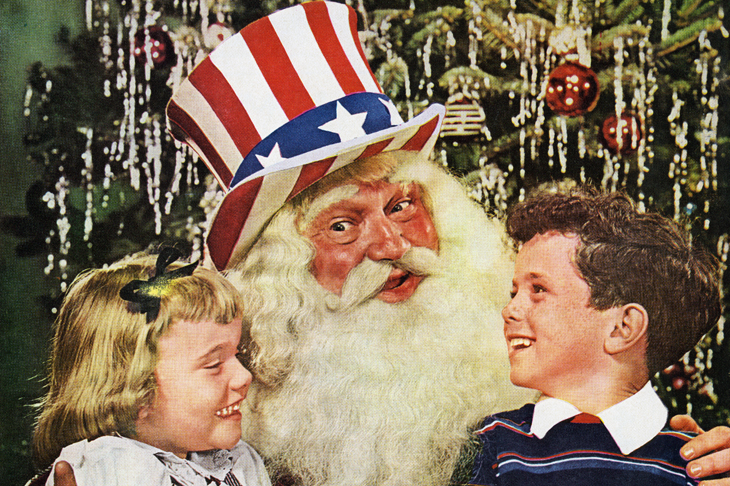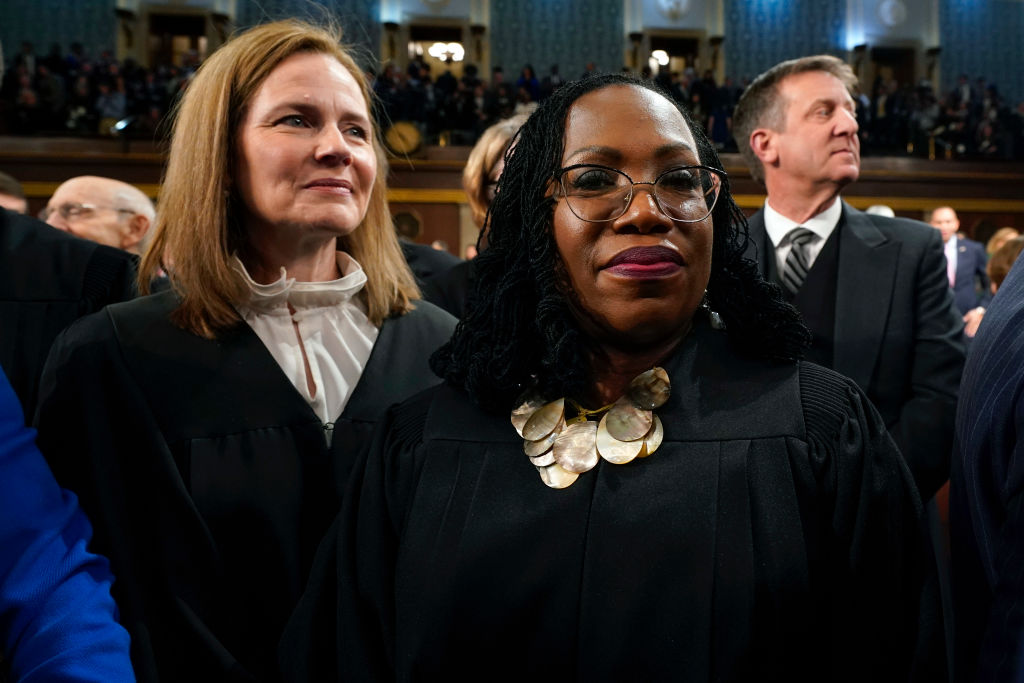The most obnoxious advert on American television this Christmas season features a thirtyish man telling his wife he ‘got us a little something’ at a holiday sale. He leads her out to the colossal driveway of their newly built modernist mansion to show her just what: two brand-new GMC pickup trucks, a boxy, blue one for him and an effeminate, red one for her.
Anyone who has watched more than an hour of American TV over the past decade will know what comes next. She happens to like the blue ‘man’s’ one, leaving him to admit meekly that, well, he’s fond of red. In the world of American corporate copy-writers, it is always Becky who’s trying to get the yard work done so she can watch the football game over at the boozer, and it’s always Bucky who can’t concentrate on cooking dinner because he’s so busy daydreaming about redoing the drapes. Viewers have come to take this gender surrealism for granted.
What was galling about the ad, though, was something that may not even have crossed the GMC copywriters’ minds. That blue truck is a Sierra. It carries a list price that can run to $69,000. The red one is a more modest Yukon. Those only go up to about $66,000. Still, we are talking about $135,000 worth of truck and — even if you get it on sale — about a man giving a Christmas gift to himself that is worth more than the annual income of the median American family. There are a lot of new-car-in-the-driveway adverts like this. If you stay tuned, you may see Kay Jewelers’ exhortation to buy your wife not one but two diamonds for Christmas. ‘One diamond for your best friend,’ Kay advises, ‘one diamond for your true love.’
Everyone loves Christmas, but the materialism of the holiday has long unhinged Americans. In his poem ‘Church Going’ Philip Larkin uses the expression ‘Christmas addict’. Perhaps that was poetic license when Larkin wrote it, half a century ago. Today there are articles in women’s magazines and on gossipy websites with titles like ‘How Not to Go Bankrupt This Christmas’. The way the distinctly American holiday of Thanksgiving falls in late November turns the entire holiday season into a festival of excess. Advent now becomes a kind of anti-Lent where, instead of taking a break from our vices, we pick up new ones. Instead of having a last blowout (Mardi Gras) before several weeks of penitence, Americans have a feast of humility and gratitude (Thanksgiving) followed by a month of going overboard.
Nothing is ever enough. Radio stations, in the age before the internet, used to play Christmas carols now and then. Some would play carols nonstop after 6 p.m. on Christmas Eve. Today, the streaming wireless network Sirius XM Radio has 16 whole channels dedicated to different sub-genres of holiday-season music, and they run all month long. There is the Holly station, Holiday Traditions, Rockin’ Christmas, and even Radio Hanukkah — even though Hanukkah carols are so rare that the station probably has to resort to playing comedian Adam Sandler’s ‘Hanukkah Song’ (Drink your gin-and–tonukkah / And smoke your marijuanukkah) several times a day.
All addictions draw on what is best in a person. If they did not, they would simply be boring character flaws. In recent weeks Donald Trump has acquired a 19ft-high Christmas tree and a gingerbread house that weighs 300lb. That is not so different from what an ordinary American in his position would do. When he was running for president, Trump promised, as conservatives often do, to make Christmas more central to the country’s culture, and urged using the expression ‘Merry Christmas’ in place of ‘Happy Holidays’. It is about the only thing he has ever been sentimental about. ‘The word Christmas…’ he sighed, sounding stricken and wholly sincere. ‘I love Christmas. I love Christmas. You go to stores now, you don’t see the word Christmas.’ Similarly, Bill Belichick, the coach of the New England Patriots, is known for his icy taciturnity, even his surliness, at postgame press conferences. And yet when a journalist, cracking wise, asked him a few years ago if he had a favorite Christmas carol, Belichick was as sentimental as Trump. ‘Actually, I enjoy all of them,’ he said. ‘I really do. Pretty much whichever one comes on, it puts a smile on my face.’ If Americans are overdoing Christmas, it is not because they hold it in contempt but because they love it to death.
The country gets more Christmassy even as it gets less Christian. That is probably not an accident. Most of America’s Christmas traditions — with trees, stockings, fires, carols — were imported with the German immigration of the 19th century. Germans remain the largest ethnic group in the United States. After the German language and most of its folkways were driven out of American life during the first world war, Christmas became the main avenue through which German-American culture lived on. Its pleasures, as Americans understand them, are hard to distinguish from those of today’s faddish Teutonic concept, hygge: cosiness, family and making the best of bad weather. Christmas now seems like the opposite of the American way of life, as hygge seems a dangerous kind of anti-Americanism. For as long as the season lasts, Christmas supplies what Americans don’t have enough of in their lives. It is a counterculture.
The great American Christmas songs — ‘I’ll Be Home for Christmas’, ‘White Christmas’, ‘Winter Wonderland’ — are about the warmth of family, the solidity of small-town life, the building of human relations on a bedrock of decency, and above all the love of tradition. If Americans are devoted to Christmas more zealously, fanatically, excessively than ever, it may be because the destruction of familiar traditions has ceased to be an unfortunate side-effect of American culture and started being its raison d’être.
This article was originally published in The Spectator magazine.

























